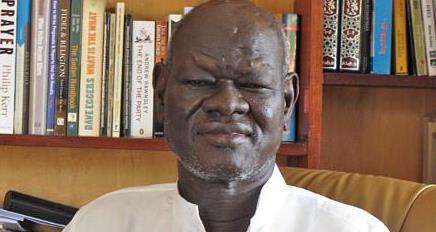This is a pertinent question to the South Sudanese leaders both in the government and in opposition as well as to those standing on the side lines. I take this question from what Prof. Jok Madut said on his Facebook page on 27 October, 2018.
It was about celebrating the revitalized peace agreement before the parties started the actual implementation. His concern that “celebrating now is to isolate the leadership from the people, to show that leaders only think of appeasing each other and nothing else.” I would wish that they only appeased each other but left the people in peace and in one piece.
I am puzzled more when different at cross purpose messages emanate from Juba. The government is saying one thing but the zealots in the SPLM are saying something different in the peace rallies they are conducting in the suburbs of Juba in the name of what they categorize as ‘sensitizing the people about the R-ARCISS.’ I would prefer to call it conscientization than sensitization. However, this is besides the message I wanted to deliver.
We are in the second month of the pre-transitional period to prepare the country for the transitional period, which begins in earnest on 12 April 2019. During this time, the parties should put in place the institutions and instruments of governance during the three-year transitional period. The celebration of the revitalized agreement takes place while violations to the provisions are taking place that raised suspicion and reluctance by some leaders of the opposition to go to Juba. Mind you President Bashir will have to assure the safety of Dr. Riek Machar and other opposition leaders in Khartoum who will accompany him to Juba.
I believe the pre-transitional period is time to build trust and confidence between the South Sudan political leaders bitter contesting the country’s leadership. The celebration in Juba should be the start of serious national dialogue among the political leaders since they have already agreed on how to share power. By national dialogue I don’t mean negotiations; rather I am talking about a political discourse to have a scientific and correct understanding of the fundamental problem of the people of South Sudan.
I come from the political school or thought which attribute the social, economic and political crisis afflicting South Sudan and its people in their social formations is NOT power but poverty and ignorance consequent to their socioeconomic and cultural underdevelopment.
All other contradictions like ethnic nationalism, corruption, insecurity, conflicts are secondary or offshoots of poverty and ignorance. No doubt, had the South Sudan political leadership known this fundamental truth they would not have unleashed the civil war. It is therefore important that the leaders take time to study the situation and understand it well. I would call on President Salva Kiir Mayardit to take the initiative commensurate with his statement that he has forgiven all and sunder including those who have been writing about him and his government.
He is the president of the country and therefore has all the power and authority to call the leaders of the opposition, including those who rejected the revitalized agreement, to a meeting to workshop and problematize the fundamental problem of South Sudan.
The objective of such a meeting would be to come up with a political programme or plan in the social, economic and political domains, which the revitalized transitional government of national unity (R-TGONU) would implement during the three-year transition period.
The R-TGONU should really be an expression of unity of purpose translating into reality our people’s desire and yearning for peace. It should really be a genuine and a patriotic effort to put South Sudan back on its feet in the manner we struggled for liberation and its independence. South Sudan cannot afford again to waste away and remain the sick man of Africa.
We have seen in the countries of the region, to which many of our people are refugees, that leaders are working hard to compensate for lost time and development opportunities. Therefore, President Kiir’s reasons for convening this leadership workshop is to prepare a transitional government that will deliver on something he and other leaders have agreed on. This means that the R-TGONU he will commission on 12 April 2019 will be a government with a plan of action and this will determine those who will be appointed to serve in those portfolios. It can’t be any other way.
The leaders of the opposition have a duty and responsibility to ensure the successful implementation of the R-ARCISS. Therefore, the question, what next? Is addressed equally to the opposition leaders. To appreciate its depth significance requires a change of attitude and a shift in political thinking. We can’t force President Kiir to change his attitude without a corresponding transformation on the other side. The destruction that has afflicted is a shared responsibility particularly for many of us who were in the SPLM/A and its splinter variants.
In conclusion, South Sudan is bigger than any individual, group of individuals or any single ethnicity. For those who strive for power, let us think critically and strategically how power could be used to serve the people than personal or ethnic ambition. Losing or not being in a position of authority is not in itself a limit situation. The most critical factors in the struggle for power and leadership are civility, ideology or knowledge and organization.
The author is a prominent South Sudanese academic and politician.
The views expressed in ‘opinion’ articles published by Radio Tamazuj are solely those of the writer. The veracity of any claims made are the responsibility of the author, not Radio Tamazuj.




